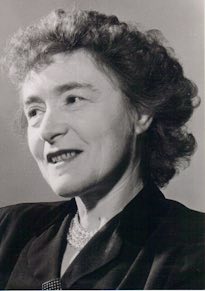Gerty Theresa Radnitz Cori, a pioneer in biochemistry, received international recognition for discovering, along with her husband, Carl, how glucose is converted into glycogen, a process dubbed the Cori Cycle.
Her research had a profound effect on the treatment of diabetes, allowing physicians to understand how the body stores glucose by converting it into glycogen stored energy, which can be used when the body’s reserves run low.
In 1947, she and her husband, along with Bernardo A. Houssay, received the Nobel Prize for Physiology and Medicine for this discovery. Cori’s later studies on enzymes and hormones further advanced research in the treatment of diabetes and contributed to our understanding that missing enzymes indicate defective genes. This laid the foundation for future studies of genetic defects in humans.
Cori received her M.D. at the German University of Prague in 1920 and came to the United States in the 1920s. Despite her significant research, she had to fight discrimination and nepotism rules.
Finally, in 1947, the same year she became the first American woman and the third worldwide to receive a Nobel Prize in the sciences, as well as the first woman to be awarded the Prize in Physiology or Medicine, she was named a full professor of biochemistry at Washington University in St. Louis. In 1950, President Harry Truman appointed her to the Board of Directors of the National Science Foundation.

